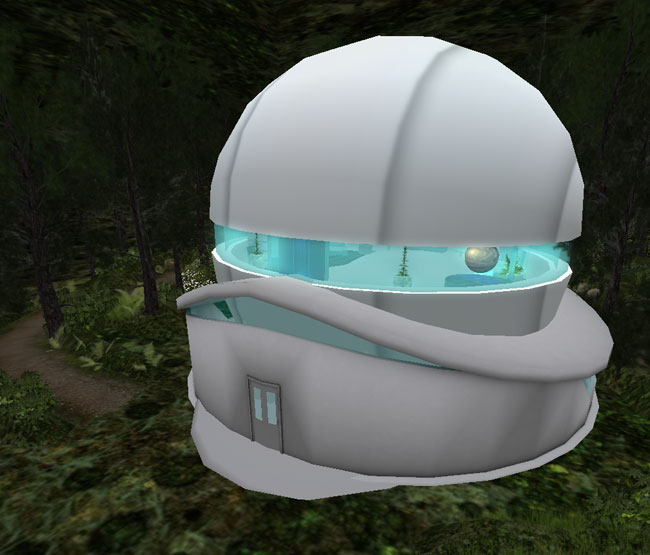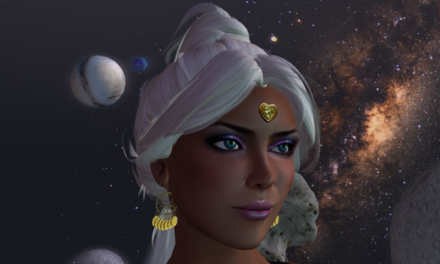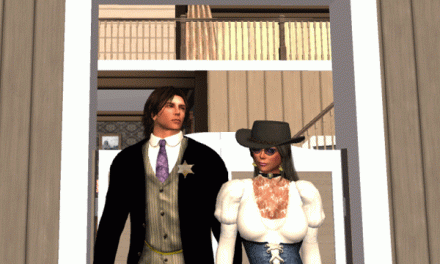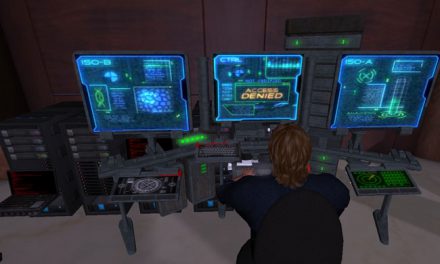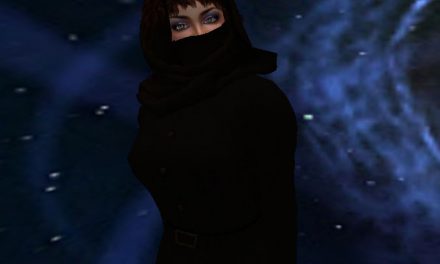 The Lost Girl
The Lost Girl
by
Tom Howard
She pulled the blanket over her head and groaned.
“Mildred!” her mother called again. “You’re going to be late for school.”
As usual, Mildred had left the curtains to the large window in her bedroom open, and the morning sunlight streamed in with unrelenting cheerfulness.
“Were you up late again working on your project?” her mother asked.
Mildred had lost a batch of nanites the night before, part of her college admissions project and the pitiful result of a month’s work. So far, she’d only been able to make them transmit sound and images for a brief period.
“Mildred, are you up?” her mother repeated. “Don’t make me conference in your father.”
Fat chance. Dad’s work in his surgery pod on the other side of the complex required he be up and active long before Mildred got out of bed. He said he did his best work in the morning, no matter what time it was wherever his patient lived.
“No,” she said with another moan. “Aren’t you at work already?”
“Yes, but the house computer notified me you were still in bed. If you want me to look at your project for you, I’ll request authorization.”
“No thanks.” Mildred got out of bed, stretched, and moved to the window to see if anyone lurked in the wilderness beyond the robot-manicured lawn. The grass outside her pod was green and lush, but the foliage nearer the forest was brown and crisped by the summer sun.
She saw no one at the edge of the forest.
Her mother continued, “Perhaps if you studied something less controversial.” Although her voice seemed caring and light, Mildred knew her mother disapproved of her nanites. Since the Singularity War of 2022 and the death of billions, the government banned machines with artificial intelligence and carefully monitored Mildred’s project. She’d surprised everyone by being granted permission to study nanite technology at all.
Mildred disliked being manipulated by her mother and changed the subject. “Why did you name me Mildred? Out of all the beautiful names out there, why’d you pick such an old-fashioned one?”
Her mother’s sigh came plainly over the speakers. “Mildred was your father’s favorite aunt’s name. He felt the old names shouldn’t die out.”
“Sounds like Dad,” said Mildred. “I guess I’m lucky I’m not named Martha or Clementine.”
“Are you going to change your name after the ceremony?” her mother asked, referring to Mildred’s upcoming sixteenth birthday party. During the virtual gathering, a government representative would certify she had become a responsible adult, giving her all the privileges and duties of a grown-up, including the right to change her name if she desired.
Out of the corner of her eye, Mildred caught movement outside the window. The stranger stood there, a young man in rags leaning nonchalantly against a pine tree. He waved and Mildred waved back.
“I haven’t decided, Mom. I’ll let you know. I’m jumping in the shower now. I don’t want to be late for class.”
Her mother took a minute to reply, probably distracted by her work. She tracked radioactivity levels in fresh water diatoms. After the war killed off seventy percent of humanity, people such as her mother monitored the environment carefully. “Okay, dear. Have a good day. Try not to stay up so late.”
“Bye, Mom,” Mildred said, breaking the connection and resting her hand against the cool window glass. Her mysterious visitor had disappeared into the woods as he did every morning. When she’d first spotted him at the beginning of the summer, she’d been frightened. She’d considered telling her parents and calling the local police bots, but he never approached or did anything other than wave when he saw her. After that brief communication, he always disappeared.
His presence proved such an unusual event in her regulated life that Mildred kept his existence to herself. He belonged to her alone.
As she logged onto her console, she considered the young man might be imaginary. No one lived outside or saw each other in person anymore. She didn’t recall being in the same room with one of her parents. She had dim memories of matronly caregivers as an infant, but she’d only interacted physically with housebots since she’d been able to reach a keyboard.
Her console chimed, indicating the start of her first class of the day. Too late to shower, she used her avatar to attend Ethnocentrism 101. As the instructor droned on about the imbalance of financial power in the 21st century, she counted the number of RSVPs to her birthday party and tried to think of a reason her nanites were unable to form themselves into the complex designs she’d desired.
After class, she jumped in the shower and dressed before calling her best friend, Tana, in Sri Lanka. Even with thirteen hours between them, tiny Tana sat at her console. Another advantage of being considered an adult.
“Have you broken up with Ivan yet?” asked Mildred. “Or are you still bringing him to my party?”
Her friend’s dimples appeared in her dark face. “Yes, he’s coming with me. I don’t know why you think he’s so terrible.”
Mildred frowned. “I don’t trust anyone who only uses an avatar to talk to people. He could be a hundred-year-old pervert or the ugly boy who lives next door.”
“You’re just jealous because you don’t have a date to your own birthday party.”
Mildred smiled. “I’m waiting for the DNAgency to find me a match. Why hook up with someone just to disconnect when they find me a genetic superman?”
“You make it sound like one of those horrible Sex Ed vids we had to watch when we were kids,” said Tana with a shudder. “Remember that labor and delivery lecture?”
“Gross.”
“Yeah, I can’t believe people actually did that. I don’t even want to know my donor. Your parents are unusual. They married after they had you conceived. Maybe your mom used another donor.”
“I’m pretty sure the doc is my dad,” said Mildred. “I have his nose.”
“Thank goodness you’ll be an adult soon and can have that fixed.” Tana had a perfect little button nose. “I’ve got some more suggestions for your new name, too.”
Mildred glanced at the clock built into her wristcom. “I’ve got class.”
“Okay, call me after, and we’ll talk about where we’re having your party. You’ve probably waited too long to reserve one of the cool virtuals.”
Mildred signed off without commenting. She glanced out the window for Peter Pan—her name for the mysterious boy in the woods—but he hadn’t returned.
I could do with a little mystery, she told herself as she joined her next class.
Peter Pan usually showed up in the mornings, but he stood in his regular spot after her last class of the day. She spotted him while packing up the microscopic nanite carcasses to send to the government. They’d inventory them and determine she hadn’t accidentally started Mildred’s Singularity War of 2044. They were restricting her to very limited research, but she could do little about it except outsmart them by creating carcasses to replace the few nanites who managed to survive.
Peter Pan’s unexpected appearance pleased her, and she moved from her small lab to the large window.
Peter, instead of lounging against a tree, stood at the lush lawn’s edge. He seemed to know the house security bots kept deer and other animals off the grounds. He didn’t wave but gestured for her to come to him. Before she thought about it, she released the unused locks on the floor-to-ceiling window and stepped out onto the small stone patio.
The unexpected blast of heat against her skin made her pause. She knew the sun’s rays could be harmful to people unused to them, and her coveralls didn’t offer much protection. For several minutes, she stood frozen, overcome with many unfamiliar sensations all at once. The smell of trees and earth was overpowering, reminding her vaguely of the small plants after the house bots had watered them. In the distance, the trees whispered with the dry wind that puffed against her skin. The sun brought warmth to her face and sweat to her body even though she wasn’t exercising.
The boy beckoned to her again, his long arms and big hands flapping as if they were caught in the wind. She put one foot—covered by a thin slipper—on the blanket of grass before she came to her senses. Frightened by her unexpected boldness, she raced back inside her sanctuary and locked the window behind her. For the first time since she was small, she pulled the curtains.
Her project timer chimed, and she forced her mind away from the boy. She busied herself setting up a new set of nanites in a silica bath. If only she could evolve them into problem-solvers, able to obtain their own energy and make their own decisions. So far, most of them hadn’t complied with her desires. Perhaps, they disliked being manipulated as much as she did.
When Tana called, Mildred set her tiny nanos aside and answered.
“Wow,” Tana said when her face appeared. “I don’t think I’ve ever seen your windows closed. I’ve got some new dragonfly wing visuals if you want to pirate them for your walls.”
“No,” said Mildred. “I’m fine.” She pressed the drapery controls without thinking, but Peter had given up enticing her into the woods. “He’s gone.”
“Who’s gone?” asked Tara, looking fresh and ready for her morning classes.
“Just a boy in the woods,” said Mildred.
“A wild boy?” exclaimed Tana. “Call the police! We had a couple of deviants here. They were mad, dangerous people who refuse to live on the grid.”
“I’m sure he’s fine,” said Mildred. “He’s probably a naturalist who likes being outside.”
“From where?” Tana looked skeptical. “There haven’t been naturalist enclaves for a decade. They’re all living in pods like ours now. You should call the police and have him checked. He may have rabies.”
“Or polio or AIDS or any of those other diseases people don’t contract anymore. Leave him alone. I’m sure he’s just someone who lives in a house nearby and likes fresh air.”
Tana frowned. “Who in their right mind would willingly go outside?”
“I went out today. It was hot.”
“Really!” squealed Tana. “All the way? Not just sticking your head out the window?”
“Yes. Hey, aren’t you going to be late for class?”
“Don’t try to change the subject, Alexandria, formerly known as Mildred. I can’t believe my best friend wants to be a deviant when she grows up.” She paused and stared at Mildred. “This isn’t some kind of birthday stunt, is it? You’ve got a new boyfriend, and you’re setting up an outdoor virtual to make us all freak out.”
“Yes, that’s it. I’m so desperate to find a perfect gene match that I have to drag wild boys out of the woods for a date. Go to class.”
“If police bots find your gnawed bones tomorrow, I’ll have to testify.” Tana’s face lit up. “I have a grieving avatar I could wear.”
“I’m going to work on my science project,” said Mildred. “I’ll talk to you soon.”
With one last look outside, Mildred deactivated the nanos and fell into bed.
#
A distant rumble woke Mildred early the next morning. She moved to watch an enthusiastic summer storm settle over her family’s valley. Recalling and ignoring Tana’s comment about her gnawed bones, Mildred unlocked the window and stepped out. The spray of water hit her, and she gasped. She could bear the stinging onslaught for only a few minutes before she returned to her room, soaked and shivering in spite of the heat. She wondered if Peter was out there laughing as she closed the door.
She took a hot shower, recalling the things she’d seen and read about naturalists. Until now, they seemed historical anachronisms, as distant as cavemen. Could she rent a virtual location that appeared to be outside and invite Peter?
As she participated in her physical conditioning class by running on the treadmill, Mildred imagined what it would be like to run outdoors. In a thunderstorm.
Tana called to remind her she had less than a week to firm up her birthday party plans. The guests had RSVPed, her parents had said they’d pay for the virtual gathering place, and the government had scheduled an official avatar to present her certificate of adulthood.
Mildred didn’t care about her party. She finally settled on a palatial setting, more for Tana’s benefit than her own, and discovered two hundred of her friends said they’d attend. Even Ivan.
Several days later, after working through the night on some promising nano applications, she stepped onto her little patio and let the sun drive the sleep from her body. She slipped outside more and more. She’d even stood on the grass until her thin slippers were soaked and squeaked when she walked.
“Hello!” someone shouted and Mildred looked across the lawn to find Peter waving at her.
She had to know. “What are you doing outside?”
“I’ve come to rescue you,” he said, his voice deep and cheerful.
His was the first real-time voice she’d heard since she’d been a baby. “What’s your name?”
“Silent John,” he replied, walking along the edge of the lawn. “Because I can walk through the forest without making a sound.”
Mildred wrapped her arms around her torso although the morning air was already noticeably warm. “Why are you watching me?”
“I thought you were imprisoned in that giant can.”
She stepped onto the grass, and the cool moisture wet her toes. “I guess my family’s pod does look like a can.”
She took a couple hesitant steps toward the boy. The security bots took no notice of her. Her DNA was on the home computer’s file.
Peter, Silent John, stood tall and thin. His light brown hair looked tangled and dirty. Tana wouldn’t have approved of his long nose and prominent Adam’s apple. Mildred couldn’t make out the color of his eyes in the forest shadows, but his face had a nice shape and would have been handsome if he used soap and water.
“You’re the first outside person I’ve met,” she said, stopping when they were close enough to talk without shouting. “It’s strange.”
“Are you sure I can’t rescue you? You could escape, breathe real air, and live the way humans are supposed to live.”
“It’s tempting, Silent John, but I like my giant can. My name is Mildred. Right now, I’m sweating so I think I’ll go back inside where it’s cool. See you tomorrow?”
He shrugged. “Maybe. I’m pretty busy. If you come, can you bring food?”
She nodded and returned to her room, leaving a soggy trail for the house bots to clean. When she looked, Silent John had disappeared.
Mildred took a dozen calls from friends asking about Peter Pan. Tana, although a good friend, had a big mouth. Mildred teased the callers by saying she’d decided to join the naturalist movement. She and her boyfriend would live on fern fronds and caterpillars if they could find an old pot and learn how to make fire. A few laughed, but most told her she’d lost her mind.
The more she thought about it, the more she was intrigued by the idea of escaping into the woods. Surely there were other people like her and Silent John out there. Her ancestors hadn’t always lived in pods, never talking to each other in person or touching anyone.
*
The next day, she threw caution to the wind and decided to investigate the outside world herself. She saved her breakfast nutrition bar and requested another. She slipped on yesterday’s dirty coverall over a clean one, put on an extra pair of slippers, and waited for Silent John to appear.
She looked around her room as if seeing it for the last time. Her lab, clean and bright, called to her, but she knew the government would never allow her to make full use of nano technology. Two completed devices, encased in little black marbles, rattled in her hand as she placed them in her pocket.
When Silent John appeared, she almost changed her mind. Instead, she signed off her console and ran to join him at the edge of the forest.
“Are you ready to be rescued yet?” he joked, stepping aside to allow her to walk up the animal trail ahead of them. Up close, Silent John proved even dirtier than he first appeared. He smelled. But his hazel eyes danced, and his grin made her smile in return.
He didn’t touch her. He seemed to sense physical contact would make her uncomfortable. Mildred took a deep breath, intoxicated by the new experiences and sensory overload. The forest smelled alive. Sounds of creaking limbs and insects surrounded her. Cool wind blew against her face, contrasting with the dapples of warm sunlight peeking through the trees. She couldn’t understand why people had given this up.
#
By the end of the day, Mildred had enough of the outdoors to last her a lifetime. Her feet were wet, bugs had bitten her arms and neck, and she was hot, tired, and filthy. Silent John had taken her arm when she slipped in a puddle. Afterwards, he found other excuses to keep touching her. After the first electrifying shock of being in physical contact with another human being, she became annoyed at his hovering.
Branches caught in her hair and thorns tore at her coveralls. Silent John laughed when she asked him to point out the bathroom. Whatever her tough, hirsute ancestors had gone through, she no longer wanted to imitate them.
She stopped in the middle of a trail strewn with small black pellets Silent John told her were animal excrement. “No,” she said.
“No what?” asked Silent John, placing a grimy hand on her shoulder.
“No, I’m not living here. I’m tired, sweaty, and I itch all over. I want to go home.”
He laughed. “You’re not giving it a chance, Millie. Let’s camp out tonight and get to know each other better.” He squeezed her shoulder.
She pushed his hand off. “Don’t call me Millie. I want to go home NOW.”
“And how do you propose to do that? You lost your wrist com in that mud hole back there.”
“You brought me out here. Take me back.”
“What if I don’t?” he asked with a grin.
“Then, I’ll find my own way, not matter how long it takes. When I do, I’ll tell the police bots how you lured me here. You’ll be reconditioned and locked up for the rest of your life.” She made that last part up, but her anger overwhelmed her. She refused to be ridiculed by a smelly boy with yellow teeth.
“Okay, okay,” said Silent John. “Follow me.”
They were quiet as they made their way up the side of a mountain. Mildred’s slippers were tatters on her feet, and she felt each pebble she stepped on.
“I thought you wanted to break out of your tin can,” grumbled Silent John, “to escape your oppressor.”
Mildred snorted. “I did, before I discovered freedom didn’t have toilet paper. I won’t tell anyone you’re out here but don’t spy on my house anymore.”
Silent John lived up to his name the rest of the way home. When she stepped onto the lawn surrounding her house, Mildred felt so grateful, she almost cried.
“Are you sure you won’t change your mind?” Silent John asked.
She walked toward her home without looking back. “Never.”
Mildred threw her battered slippers in the recycler and showered for so long the house computer asked if she needed a session with the autodoc.
“No,” she replied, rewashing her hair for the third time to ensure no living creatures still resided there. Satisfied, she dried herself and sat at her console in her robe.
Ignoring the stored calls from her parents, friends, and school, she accessed her nano monitoring software. She’d slipped a nano marble into Silent John’s pocket during one of her many falls. The blurry picture revealed his current surroundings.
The nanos were locating themselves where they could see the entire room. Instead of revealing a fire-warmed cave or a rustic cabin as she expected, the screen showed a brightly lit office with two individuals engaged in conversation. Silent John sat sprawled in a white chair, addressing an older man behind a chrome console.
Silent John laughed. “You should have seen her, sir. She had to pee behind a bush! You’d have thought I’d asked her to be the mother of my twelve children from the expression on her face. And that new pheromone salve works great. Bugs came from miles away to chew on her in the heat.”
The man nodded. “Do you consider the case finished?”
“Oh yeah,” said Silent John. “There’s no chance she’ll ever become a naturalist now. She’ll probably never step outside again.”
“Good work. There’s an adolescent boy in Sector 13 who is showing early signs of being a non-conformist. I’ve already uploaded his file to your wrist com.”
“I hoped for a little time off, sir. I’d love to spend the day in the shower. I’ve got moss growing in places it shouldn’t be.”
“Sorry, John. You know we can barely keep up with these lost boys and girls now. If one of them should discover how fragile our society is, the entire thing might crumble.”
“Why her?” asked Silent John. “She didn’t seem very special.”
Mildred stuck her tongue out at the screen. The big fat liar hadn’t seemed very special either.
“Her open window gave us a warning. Why would she need to see the outside if she had the entire virtual world at her fingertips? We only gave her permission to use nanites to see if it would lead to non-conformity.”
“And now that it has?” asked Silent John, scratching at something under his tunic.
“We’ll rescind her authorization to study them further. You have successfully directed another wayward child onto the right path.”
“Yeah,” said Silent John, “but after this boy, I’m burning these clothes and scrubbing the dye from my teeth.”
“We’ll see,” said the man. “Report back tomorrow.”
The image faded as the nanites reached the end of their lives and dissolved into dust.
Mildred, angry and frustrated, forced herself to calm down. She erased the visuals she’d just seen. If they were watching her, she needed to be more discreet. From now on, she’d be a sterling example of conformity. They’d learn she wasn’t as easy to manipulate as nanos.
She’d start at her birthday party. A life of confinement had to make others unhappy, too. Her new project would be to find them and discover how “fragile” their society really was.
She rose, crossed to the window, and closed the drapes.
THE END
